March 3, 2015
Edited by David Sanders
Specimen Days
1459 – Ausias March, Catalan poet, dies.
1606 – Edmund Waller, England, poet (Penshust), is born.
1652 – Thomas Otway, England, playwright/poet (Venice Preserved), is born.
1858 – Jozsef Bajza, Hungarian author/poet/critic, dies at 54.
1886 – Tore Ørjasæter, Norwegian poet (d. 1968), is born.
1903 – Rabbe A Enckell, Fins author/poet (Lutad about Brunnen), is born.
1909 – Kenton Kilmer, poet/translator, is born.
1926 –James Ingram Merrill, US poet/author (Scripts for the Pageant), is born.
1939 – Hans Pieter Verhagen, Dutch poet (Hoepla/Holland's Hole), is born.
1947 – Clifton Snider, American poet and writer, is born.
1991 – Clara Eggink, [Ebbele], Dutch poet (Life with J C Bloem), dies at 84.
2006 – Ivor Cutler, Scottish poet (b. 1923).
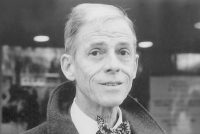
Log
Then when the flame forked like a sudden path
I gasped and stumbled, and was less.
Density pulsing upward, gauze of ash,
Dear light along the way to nothingness,
What could be made of you but light, and this?
—James Merrill (1926–1995)
“When the flame forked like a sudden path / I gasped and stumbled, and was less” – James Merrill
World Poetry
Szymborska’s Poem Book to Be Released in Iran Soon

A collection of poems composed by the Polish Nobel laureate Wisława Szymborska-Włodek titled ‘Nothing Twice’ translated into Persian by Malihe Baharloo will be released by Cheshmeh Publications. In an interview with IBNA, Baharloo said: “This collection comprises all poems by Szymborska in different periods of her career which had already been translated into English. It took me three years that I finished translating this compilation.” “Although simply two collections of poems by Szymborska have already been published in Persian but she is extremely known in Iran and a number of young Iranian poets have been influenced by her,” she added.
PEN and Amnesty Call for Release of Imprisoned Poet Mohammed al-Ajami
Amnesty International and literary network english PEN called for the release of Qatari poet Mohammed al-Ajami on Wednesday, exactly two years after he was sentenced to 15 years' imprisonment. In a joint statement, the organizations demanded that the Qatari government immediately release al-Ajami without conditions and reverse his conviction.
Former Miss Turkey Could Go to Jail for Posting Satirical Poem about President Recep Tayyip Erdogan
Former Miss Turkey, Merve Buyuksarac, might have to pay the consequences for insulting President Recep Tayyip Erdogan on social media. She reportedly faces jail time for comments that are considered offensive. Buyuksarac’s lawyer, Emre Telci, said on Wednesday his client faces a maximum of two years behind bars for it.
A collection of poems composed by Nobel laureate Wisława Szymborska-Włodek was translated into Persian
Recent Reviews
Alice Fulton’s ‘Barely Composed,’ and More
by Daisy Fried
In her eighth collection, Fulton removes language from its standard literary and idiomatic proprieties, splicing dictions, jerking and whimsying her way from tone to tone, inventing words (“protogeegaws,” “hushdriven”), making puns and surprising declarations by way of offhand image: “all emotion’s leveled, the way a child will draw / a snowman and a mansion the same size.” A poet of both meanders and economies, Fulton embraces mannered play as serious business.
Jorie Graham’s ‘From the New World’
by Craig Morgan Teicher

Writing about Jorie Graham at this point, seven books after she won the Pulitzer Prize for “The Dream of the Unified Field: Selected Poems 1974-1994,” means joining a cacophony of voices. Google her name and you will find her elders, her peers and those she has influenced (and she has influenced most poets younger than she is, and not just in English, whether they know it or not) making cases for and against the importance of her work.
Writing about Jorie Graham means joining a cacophony of voices.
Broadsides
Where Rimbaud Found Peace in Ethiopia
by Rachel B. Doyle

In December of 1880, the mercurial French poet Arthur Rimbaud entered the ancient walled city of Harar, Ethiopia, a journey that had involved crossing the Gulf of Aden in a wooden dhow and 20 days on horseback through the Somali Desert. Several years before, the author of the prose poems “A Season in Hell” and “Illuminations” had abruptly renounced poetry and embarked on peregrinations that would take him around Europe, Asia, the Middle East and, finally, Africa.
Bringing a Daughter Back From the Brink With Poems
by Betsy MacWhinney
When George W. Bush was re-elected in 2004, my 13-year-old daughter, Marisa, was so angry that she stopped wearing shoes. She chose the most ineffective rebellion imaginable: two little bare feet against the world. She declared that she wouldn’t wear shoes again until we had a new president.
In the Gloom the Gold
by Jamie James
Ezra Pound never made it easy. He was a poet who cared little about public success and not at all about money: he dedicated his life to art with the rapturous abandon of a bacchant. Pound saw himself as forging ahead on the path poets had pursued since the preclassical bards, toward deeper wisdom and a more perfect expression, in pursuit of the beautiful. In the years since his death, this perennial vision of an enlightened Republic of Letters, one of humankind’s greatest intellectual accomplishments, has quietly gone the way of falconry and intaglio carving. So impenetrable and taxing do Pound’s poems appear to most modern readers that the soaring ambition of his work has been eclipsed by the neatly plotted narrative of his life
“Poetry Makes Nothing Happen”: W. H. Auden’s Struggle with Politics
by Robert Huddleston
In its day, W. H. Auden’s claim that “poetry makes nothing happen” was a necessary reproof to an ideologically mandated culture of protest that had a chokehold on the literary left in the 1930s, an example it remains important to consider today. Clashes over the political rights and wrongs of poetry, then as now, are often disguised contests over cultural and academic turf, ideological purity, and even the relative priority of criticism versus artistic practice.
In December of 1880, the mercurial French poet Arthur Rimbaud entered the ancient walled city of Harar, Ethiopia.
Drafts & Fragments
Mystic, Monk & Poet—Meet the Newest Doctor of the Church
by Kevin Jones
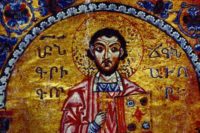
St. Gregory of Narek – a tenth century priest, monk, mystic, and poet beloved among Armenian Christians – has become the first Armenian to be named a Doctor of the Church. “It is a great honor for the Armenian Church to contribute to this very important rank of saints who have enriched the Catholic Church with their teachings,” Armenian Catholic priest Father Thomas Garabedian told CNA Feb. 23.
T. S. Eliot Foundation Buys Poet's Gloucester Summer Home
By Joann Mackenzie

The 120-year-old, 5,619-square-foot rambling shingled “cottage” at 18 Edgemoor Road sold on Dec. 3 for what many might consider its fair market value: $1.3 million. But to Coldwell Banker’s Gretchen Parker, it was no ordinary transaction. And to its buyer — The TS Eliot Foundation, a United Kingdom nonprofit organization — it is no ordinary house.
St. Gregory of Narek was a tenth century monk, mystic, and poet who is beloved among Armenian Christians.
Poetry In the News
Poet Pablo Neruda to Be Reburied in Chile Following Judge's Ruling
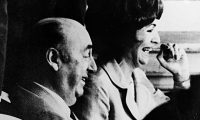
A judge in Chile has ordered that the body of poet Pablo Neruda should be returned to his grave for reburial alongside the remains of his third wife, Matilde Urrutia, putting an end to an international investigation into the cause of his death in 1973. For nearly two years, Neruda’s remains have been lying in forensic laboratories in three countries – and from early this year in a fourth – in an attempt to determine whether his death may have been accelerated by poisoning.
Angie Estes Wins Claremont Graduate University's 2015 Kingsley Tufts Poetry Award
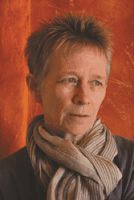
Claremont Graduate University (CGU) is pleased to announce that Angie Estes, of Urbana, Illinois, has won the $100,000 Kingsley Tufts Poetry Award for her book Enchantee (Oberlin College Press). The award, given annually to a mid-career poet, is among the world’s most generous and distinguished prizes for poetry.
A judge in Chile has ordered that the body of poet Pablo Neruda should be returned to his grave for reburial.
New Books
More Money than God by Richard Michelson
[Paperback] University of Pittsburgh Press, 80 pp., $15.95
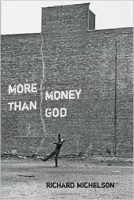
How do we come to terms with loss? How do we find love after tragedy? How can art and language help us to cope with life, and honor the dead? How does one act responsibly in a world that is both beautiful, full of suffering, and balanced precariously on the edge of despair and ruin? With humor, anger and great tenderness, Richard Michelson’s poems explore the boundaries between the personal and the political, and the connections between history and memory.
From the Valley of Making: Essays on the Craft of Poetry by David Wojahn
[Paperback] University of Michigan Press, 240 pp., $29.95
David Wojahn examines the state of American verse as it enters the first decades of a new millennium, focusing on both the challenges and opportunities of an ancient art as it tries to adapt to the cultural, technological, and political transformations of our turbulent era. Each of these nine essays makes an impassioned and nuanced argument against the so-called marginalization of poetry in contemporary American culture.
The Penguin Book of Russian Poetry edited by Robert Chandler, Irina Mashinski, and Boris Dralyuk
[Paperback] Penguin, 592 pp., $12.07
An enchanting collection of the very best of Russian poetry, edited by acclaimed translator Robert Chandler together with poets Boris Dralyuk and Irina Mashinski. This anthology traces Russian poetry from its Golden Age to the modern era, including work by several great poets – Georgy Ivanov and Varlam Shalamov among them – in captivating modern translations by Robert Chandler and others. The volume also includes a general introduction, chronology and individual introductions to each poet.
S O S: Poems 1961-2013 by Amiri Baraka
[Hardcover] Grove Press, 560 pp., $30.00
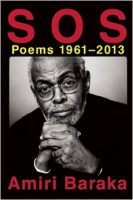
Fusing the personal and the political in high-voltage verse, Amiri Baraka—"whose long illumination of the black experience in America was called incandescent in some quarters and incendiary in others" (New York Times)—was one of the preeminent literary innovators of the past century. This volume comprises the fullest spectrum of his rousing, revolutionary poems, from his first collection to previously unpublished pieces composed during his final years.
Richard Michelson’s poems explore the boundaries between the personal and the political.
Correspondences
On 'The New Yorker Presents': A Q&A with Poet Matthew Dickman
by Dave Odegard

"The New Yorker Presents" features an assortment of short films based on content originally published in its print parent. It was announced earlier this month that "The New Yorker Presents" is indeed one of the five series with which Amazon will move forward. One of the short pieces in the series is a film version of a selection from the poem "King" by Matthew Dickman, performed by Andrew Garfield ("The Social Network," "The Amazing Spider-Man"). Dickman, along with his identical twin brother (and fellow poet), Michael, has seen his poetry published in the famed magazine since 2008. He and his brother were even the dual subjects of a 2009 full feature profile.
His Late First Wife Inspired the Poetry of his Second Wife. Then He Lost Her, Too.
by Glenn Dixon
The ceiling fixture in Claudia Emerson’s study only weakly puts out light. Her husband, Kent Ippolito, apologizes for it, but it’s no bother. The room isn’t oriented toward the house. High atop the second story in a quiet neighborhood in Richmond, with sunlight streaming in on three sides, this is an observation post for a poet attuned to the natural world. It’s a private place, and we hadn’t planned on visiting it. The last thing Ippolito told me before we drove over was that he hadn’t been able to bring himself to spend any time here.
How to Access the Spiritual Power of Poetry–Even if You “just don’t get it”
by Jonathan Merritt
New York Times columnist David Brooks called Christian Wiman’s “My Bright Abyss: Meditation of a Modern Believer” the “best modern book on belief.” It’s high praise, and from one who was enraptured by the book, it is also well-deserved esteem. But Christian Wiman, a professor at Yale Divinity School, was a poet long before he tried his hand at prose. He believes that poetry has significant spiritual power in addition to aesthetic value. So I decided to sit down with him and discuss how people of faith can begin accessing the spiritual power of poetry even if, at first, they “just don’t get it.”
Loss and Gain in Kevin Young's Poetry
by Michael Lionstar

So observes Kevin Young, whose latest poetry collection, the bittersweet "Book of Hours," emerged from two life-altering events: the death of his father and the birth of his son. "Poems speak to grief and even joy better than most anything else," Young tells me, during a recent morning phone call. "That's why we read poems at weddings and funerals. We remember the way words can make us feel and transport us.”
Poet Embraces Eastern Philosophy to Heal from Sexual Abuse
by Anya Van Wagtendonk
Afaa Michael Weaver has received numerous awards for his poetry, including a Fulbright scholarship, a Pen Fellowship, a Pushcart Prize and an NEA fellowship.
Afaa Michael Weaver has received numerous awards for his poetry, including a Fulbright scholarship, a Pen Fellowship, a Pushcart Prize and an NEA fellowship. Twenty-one Chinese characters mark the start of “City of Eternal Spring,” poet Afaa Michael Weaver’s newest book. “So that I might hear the quiet voice of the union of heart and mind,” the inscription reads, “help me forget the past and the future.” Weaver wrote the epigraph, inspired by a chapter of the foundational Doaist text Dao De Jing, to guide him through writing “City of Eternal Spring.” The book concludes a trilogy that deals with a painful childhood that included sexual abuse.
Recently actor Andrew Garfield performed the Matthew Dickman poem “King.”
Envoi: Editor’s Notes
Lessons from the Past: Yvor Winters
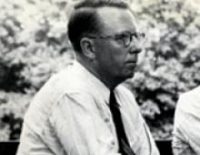
Poetry, as nearly as I can understand it, is a statement in words about a human experience, whether the experience be real or hypothetical, major or minor; but it is a statement of a particular kind. Words are symbols for concepts, and the philosopher or scientist endeavors as far as may be to use them with reference to nothing save their conceptual content. Most words, however, connote feelings and perceptions, and the poet, like the writer of imaginative prose, endeavors to use them with reference not only to their denotations but to their connotations as well. Such writers endeavor to communicate not only concepts, arranged, presumably, either in rational order or in an order apprehensible by the rational mind, but the feeling or emotion which the rational content ought properly to arouse. The poet differs from the writer of any kind of prose in that he writes in metrical language.
“Poetry, as nearly as I can understand it, is a statement in words about a human experience.” – Yvor Winters